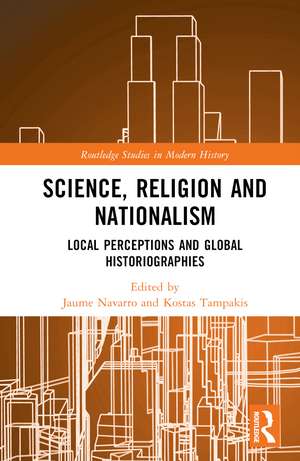Science, Religion and Nationalism: Local Perceptions and Global Historiographies: Routledge Studies in Modern History
Editat de Jaume Navarro, Kostas Tampakisen Limba Engleză Hardback – 22 dec 2023
This book explores the interface between science, religion and nationalism at a local level, paying attention to the roles religious institutions, specific confessional traditions, or an undefined notion of “religion” played in the construction of modern science in national contexts: the use of anti-clerical rhetoric as scapegoat for a perceived scientific and technological backwardness; the part of religious tropes in the emergence of a sense of belonging in new states; the creation of “invented traditions” that included religious and scientific myths so as to promote new identities; the struggles among different confessional traditions in their claims to pre-eminence within a specific nation-state, etc.
Moreover, the chapters in this book illuminate the processes by which religious myths and institutions were largely substituted by stories of progress in science and technology which often contributed to nationalistic ideologies.
Din seria Routledge Studies in Modern History
-
 Preț: 300.70 lei
Preț: 300.70 lei -
 Preț: 326.16 lei
Preț: 326.16 lei -
 Preț: 311.48 lei
Preț: 311.48 lei -
 Preț: 312.12 lei
Preț: 312.12 lei -
 Preț: 303.01 lei
Preț: 303.01 lei -
 Preț: 292.90 lei
Preț: 292.90 lei -
 Preț: 312.61 lei
Preț: 312.61 lei -
 Preț: 152.86 lei
Preț: 152.86 lei -
 Preț: 310.95 lei
Preț: 310.95 lei - 9%
 Preț: 935.05 lei
Preț: 935.05 lei -
 Preț: 327.03 lei
Preț: 327.03 lei - 9%
 Preț: 1006.10 lei
Preț: 1006.10 lei -
 Preț: 315.15 lei
Preț: 315.15 lei -
 Preț: 333.88 lei
Preț: 333.88 lei -
 Preț: 310.22 lei
Preț: 310.22 lei -
 Preț: 309.20 lei
Preț: 309.20 lei -
 Preț: 311.41 lei
Preț: 311.41 lei -
 Preț: 326.67 lei
Preț: 326.67 lei -
 Preț: 311.18 lei
Preț: 311.18 lei -
 Preț: 302.88 lei
Preț: 302.88 lei -
 Preț: 311.70 lei
Preț: 311.70 lei -
 Preț: 295.34 lei
Preț: 295.34 lei -
 Preț: 413.13 lei
Preț: 413.13 lei -
 Preț: 437.13 lei
Preț: 437.13 lei - 31%
 Preț: 764.20 lei
Preț: 764.20 lei - 31%
 Preț: 764.62 lei
Preț: 764.62 lei -
 Preț: 495.09 lei
Preț: 495.09 lei - 31%
 Preț: 762.97 lei
Preț: 762.97 lei -
 Preț: 416.22 lei
Preț: 416.22 lei - 18%
 Preț: 729.55 lei
Preț: 729.55 lei - 30%
 Preț: 823.41 lei
Preț: 823.41 lei -
 Preț: 420.77 lei
Preț: 420.77 lei -
 Preț: 490.40 lei
Preț: 490.40 lei -
 Preț: 416.22 lei
Preț: 416.22 lei - 31%
 Preț: 767.38 lei
Preț: 767.38 lei - 18%
 Preț: 1004.55 lei
Preț: 1004.55 lei - 31%
 Preț: 764.20 lei
Preț: 764.20 lei - 30%
 Preț: 876.36 lei
Preț: 876.36 lei - 18%
 Preț: 1113.91 lei
Preț: 1113.91 lei - 18%
 Preț: 1001.07 lei
Preț: 1001.07 lei - 18%
 Preț: 1000.27 lei
Preț: 1000.27 lei - 30%
 Preț: 820.73 lei
Preț: 820.73 lei - 18%
 Preț: 1000.27 lei
Preț: 1000.27 lei - 18%
 Preț: 1004.55 lei
Preț: 1004.55 lei
Preț: 1003.99 lei
Preț vechi: 1224.37 lei
-18% Nou
Puncte Express: 1506
Preț estimativ în valută:
192.12€ • 205.44$ • 160.18£
192.12€ • 205.44$ • 160.18£
Carte tipărită la comandă
Livrare economică 17 aprilie-01 mai
Livrare express 13-19 martie pentru 34.93 lei
Preluare comenzi: 021 569.72.76
Specificații
ISBN-13: 9781032320618
ISBN-10: 1032320613
Pagini: 268
Ilustrații: 2 Halftones, black and white; 2 Illustrations, black and white
Dimensiuni: 152 x 229 x 16 mm
Greutate: 0.56 kg
Ediția:1
Editura: Taylor & Francis
Colecția Routledge
Seria Routledge Studies in Modern History
Locul publicării:Oxford, United Kingdom
ISBN-10: 1032320613
Pagini: 268
Ilustrații: 2 Halftones, black and white; 2 Illustrations, black and white
Dimensiuni: 152 x 229 x 16 mm
Greutate: 0.56 kg
Ediția:1
Editura: Taylor & Francis
Colecția Routledge
Seria Routledge Studies in Modern History
Locul publicării:Oxford, United Kingdom
Public țintă
PostgraduateCuprins
1. Introduction. Science, Religion and Nationalism, or the entanglement of mythical narratives 2. “Ibn Sina the Turk”: Early 20th Century Turkish Nationalism, Islam, and the Historiography of Science 3. Science in Utopia: Tommaso Campanella’s City of the Sun in the Thought of Luigi Firpo 4. “Catholics, Natural Science, and National Belonging in Germany, 1830-1914” 5. “John William Draper and ‘Thoughts on the Future Civil Policy of America’” 6. Building a nation. Spanish Engineers in the Science-and-Religion narratives 7. The Education of the Argentine Nation. Positivists and Catholics on Science and Religion 8. Nineteenth-century Mexican nationalism, between liberalism and conservatism: positivism as the force of the nation 9. “Being Orthodox, Greek and modern: Scientists and Theologians in 19th and early 20th century Greece” 10. Between Darwin and Religion. Nation-building and the future of Poland 11. “Serving God, Fatherland, and Language”: Alcover, Catalan, and Science 12. Scientific atheism seen through the lens of historical museums
Notă biografică
Jaume Navarro is an Ikerbasque Research Professor at the University of the Basque Country. A historian of science, his interests lay in the history of physics and in the historiography of science and religion. He is author of, among others, A History of the Electron: J.J. and G.P. Thomson (2012) and Ether and Modernity (2018).
Kostas Tampakis is a Senior Researcher in the National Hellenic Research Foundation. His research interests include the history of the relations of Orthodox Christianity and the sciences and the history of science in Southeastern Europe. He has coauthored, among others, Science and Orthodox Christianity: An Overview (2016).
Kostas Tampakis is a Senior Researcher in the National Hellenic Research Foundation. His research interests include the history of the relations of Orthodox Christianity and the sciences and the history of science in Southeastern Europe. He has coauthored, among others, Science and Orthodox Christianity: An Overview (2016).
Descriere
The book illuminate the processes by which religious myths and institutions were largely substituted by stories of progress in science and technology which often contributed to nationalistic ideologies.
